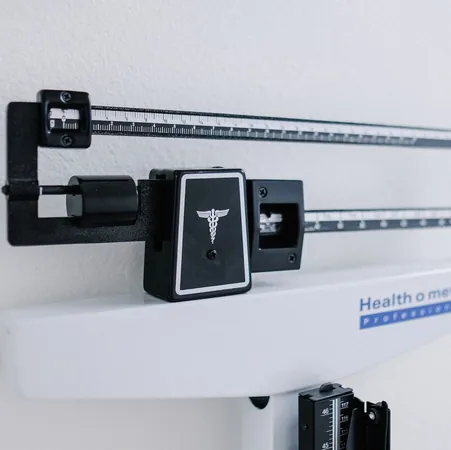
Groundbreaking Study Reveals Weight Loss Can Transform Quality of Life for Psoriatic Arthritis Patients!
2025-03-27
Author: Rajesh
Introduction
Recent research has unveiled that structured weight loss interventions significantly enhance health-related quality of life (HRQoL) for individuals with and without psoriatic arthritis (PsA). This finding sheds light on the often-overlooked relationship between obesity and joint diseases, revealing crucial insights for both patients and healthcare professionals.
The Impact of Obesity on Psoriatic Arthritis
Obesity is prevalent among those diagnosed with PsA and can exacerbate not only physical symptoms but also mental health issues such as anxiety and depression. Previous studies have indicated that weight loss positively impacts HRQoL in obese individuals with psoriasis (PsO). However, the specific effects on HRQoL for those living with PsA have been largely uncharted. Lead investigator Dr. Anton J. Landgren from the Sahlgrenska Academy, University of Gothenburg, emphasizes that prior studies have shown weight loss can improve disease activity in various rheumatic conditions.
Study Design and Methodology
The study involved 39 participants between the ages of 25 and 75 who were diagnosed with PsA, alongside 39 matched controls who were also obese. All subjects underwent a very low energy diet (VLED) over a period of 12 to 16 weeks, based on their baseline Body Mass Index (BMI). Participants’ HRQoL was assessed using the 36-item short-form health survey (SF-36) and their levels of anxiety and depression were measured via the Hospital Anxiety and Depression Scale (HADS) at several intervals: baseline, 3 months, 6 months, and 12 months.
Results
Results were promising: individuals with PsA showed significant improvement in physical HRQoL, with scores rising from a median of 34 at the start of the study to 43 after one year, a change deemed statistically significant (P = .009). Meanwhile, similar positive outcomes were witnessed in the control group, whose physical component scores rose dramatically from 44 to 52 (P < .001). Unfortunately, improvements in mental HRQoL were not statistically significant for either group.
Anxiety and Depression Improvements
Anxiety and depression levels dropped notably for both patients with PsA and those in the control group. For instance, anxiety scores decreased from a median of 3 to 2 for PsA participants and from 5 to 2 for controls, with both reductions found meaningful (P = .045 for PsA and P = .002 for controls). Additionally, depression levels diminished significantly, highlighting the mental health benefits of weight loss interventions.
Conclusion and Future Directions
Dr. Landgren and his team assert that their study offers valuable insights into how weight loss can lead to vastly improved physical HRQoL, alongside reductions in anxiety and depression. Despite the limitation of a relatively small sample size, the findings strongly support the implementation of weight loss and physical activity strategies for obese patients suffering from PsA.
Implications for Treatment
As this research paves the way for further explorations, it holds the potential to transform treatment approaches for PsA and strengthen the argument for weight management in the overall care of patients with chronic conditions. Don’t miss out on the implications of these findings — they could change the lives of millions battling obesity and psoriatic arthritis!

 Brasil (PT)
Brasil (PT)
 Canada (EN)
Canada (EN)
 Chile (ES)
Chile (ES)
 Česko (CS)
Česko (CS)
 대한민국 (KO)
대한민국 (KO)
 España (ES)
España (ES)
 France (FR)
France (FR)
 Hong Kong (EN)
Hong Kong (EN)
 Italia (IT)
Italia (IT)
 日本 (JA)
日本 (JA)
 Magyarország (HU)
Magyarország (HU)
 Norge (NO)
Norge (NO)
 Polska (PL)
Polska (PL)
 Schweiz (DE)
Schweiz (DE)
 Singapore (EN)
Singapore (EN)
 Sverige (SV)
Sverige (SV)
 Suomi (FI)
Suomi (FI)
 Türkiye (TR)
Türkiye (TR)
 الإمارات العربية المتحدة (AR)
الإمارات العربية المتحدة (AR)